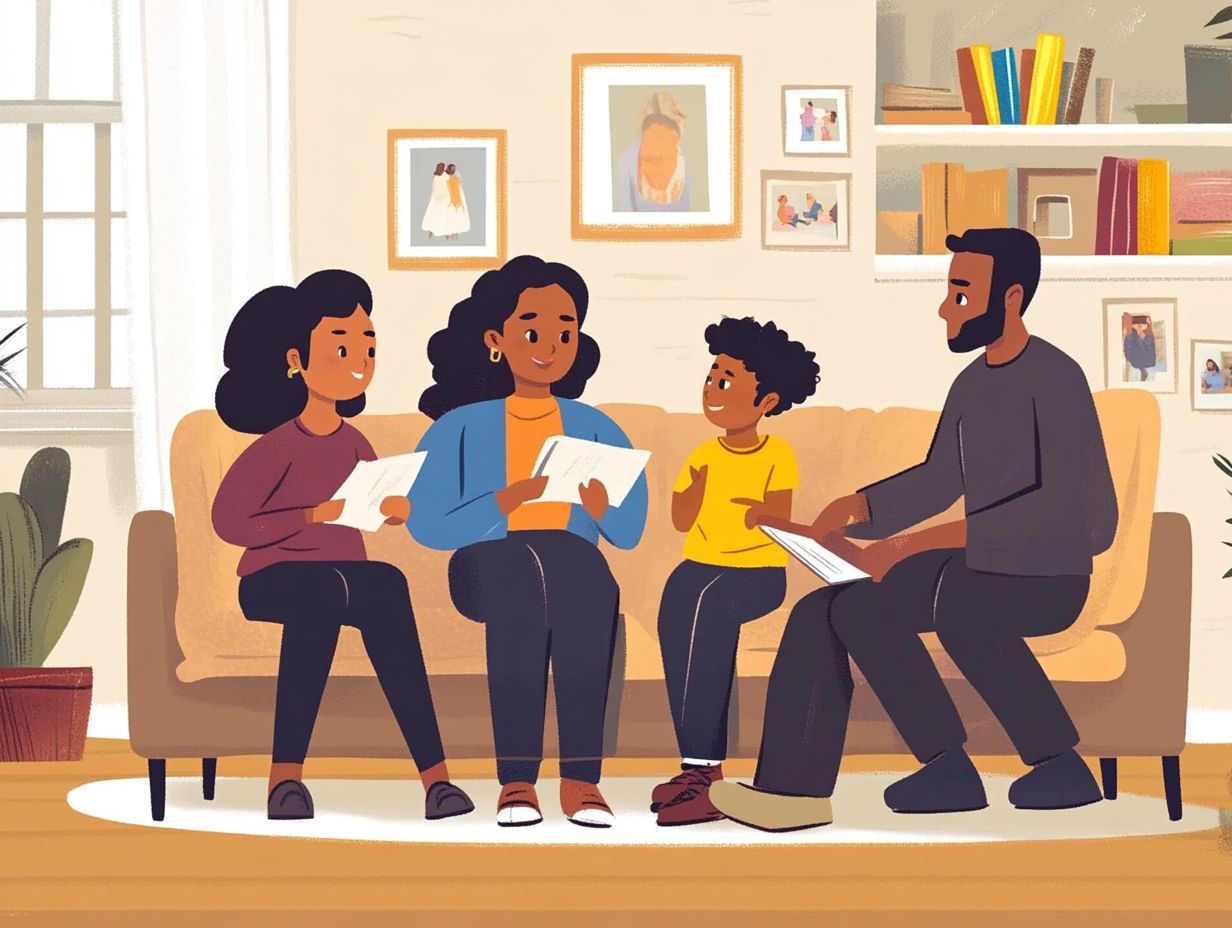5 Tips for Enhancing Family Communication
Effective family communication serves as the foundation for a thriving family dynamic. Whether you re tackling everyday challenges or celebrating milestones, the capacity to share your thoughts and feelings openly nurtures connection and resilience among family members.
This article delves into five practical tips to elevate your family communication from honing the art of active listening to carving out dedicated time for family interactions. Practicing healthy communication can significantly improve your family dynamics and build stronger relationships. It also highlights the significance of open dialogue, addresses common barriers you might encounter, and presents strategies for managing conflicts effectively.
Join the exciting journey of building stronger family bonds! Continue reading to uncover how you can make meaningful improvements!
Contents
- Key Takeaways:
- 1. Practice Active Listening
- 2. Set Aside Dedicated Family Time
- 3. Use ‘I’ Statements Instead of Blame
- 4. Encourage Open and Honest Communication
- 5. Seek Outside Help If Needed
- Why Is Communication Important in a Family?
- Frequently Asked Questions
- What are some practical tips for improving communication within a family?
- How can setting boundaries help enhance family communication?
- What role does active listening play in improving family communication?
- How can family meetings improve communication between family members?
- What can parents do to improve communication with their teenage children?
- How can family activities help strengthen communication?
- Conclusion
Key Takeaways:

- Practice active listening to truly understand and empathize with family members.
- Set aside dedicated family time to foster open communication and strengthen relationships.
- Use “I” statements instead of blaming to avoid defensiveness and promote understanding.
- Encourage independence among family members to ensure everyone feels valued.
1. Practice Active Listening
Practicing active listening is essential for cultivating healthy communication within your family. It not only enhances emotional intelligence but also encourages your children to express their feelings openly.
In return, you can provide positive feedback that nurtures a supportive environment for everyone, especially during family meetings where each member s voice truly matters. Incorporating non-verbal cues, like maintaining eye contact and encouraging nods, can further enhance understanding.
By employing techniques such as maintaining eye contact, using encouraging nods, and leaning slightly forward to show engagement, you can create an atmosphere that promotes openness. Summarizing and reflecting on what the speaker has shared demonstrates your understanding and respect, effectively breaking down any communication barriers.
These skills enable your family members to feel genuinely heard and valued, thereby strengthening your bonds and facilitating deeper connections. As you all practice these active listening strategies, you ll foster a harmonious environment that encourages healthy dialogue and mutual support, ultimately laying the groundwork for lasting relationships.
2. Set Aside Dedicated Family Time
Setting aside dedicated family time is an essential practice that cultivates healthy communication, allowing you and your loved ones to connect, nurture relationships, and discuss feelings in a safe and supportive environment. This reinforces the importance of feeling safe to speak up for both parents and children.
Regular family meetings can serve as a vital platform for checking in with one another, sharing experiences, and resolving any conflicts that may arise in daily life. During these gatherings, everyone is encouraged to voice their thoughts and concerns, creating an atmosphere of openness.
Engaging in activities like family game nights, cooking meals together, or simply enjoying outdoor adventures can elevate these discussions, making them more enjoyable and less confrontational. By incorporating fun elements, you not only boost engagement but also create a setting where everyone feels comfortable expressing themselves.
This fosters deeper connections and understanding within the family unit, enriching your shared experiences and strengthening your bonds. Start today and implement these tips now!
We encourage you to share your stories or experiences related to family communication in the comments below!
3. Use ‘I’ Statements Instead of Blame
Unlock the power of ‘I’ statements to transform your family conversations! Using ‘I’ statements is a powerful strategy for promoting clear communication and respectful disagreement within your family discussions. These statements let you express your feelings without blame. This enhances constructive interactions and fosters empathy among family members.
When you focus on your personal feelings instead of resorting to blaming others, ‘I’ statements create a safe space for dialogue, which is essential for resolving conflicts. For example, rather than saying, “You never listen to me!”, you might say, “I feel overlooked when I m unable to share my thoughts during our discussions.” This subtle shift can significantly reduce defensiveness and pave the way for genuine understanding.
Incorporating empathy into these conversations is vital. By acknowledging the emotions and perspectives of others, you can navigate disagreements more effectively, recognizing that everyone’s feelings are valid. This approach ultimately strengthens bonds and fosters a more harmonious environment within your family.
4. Encourage Open and Honest Communication

Encouraging open and honest communication within your family is essential for feeling safe to share thoughts. This approach allows each member to express their thoughts and feelings freely, promoting emotional intelligence and fostering a deeper understanding of one another s perspectives.
Creating such an environment not only strengthens familial bonds but also builds resilience, enabling your family to navigate challenges together with a strong sense of support. Implementing regular check-ins those brief moments when everyone shares their feelings or experiences can significantly enrich this atmosphere of trust.
Reinforcing positive feedback when someone opens up not only validates their courage but also encourages them to continue sharing. These strategies cultivate a culture in which every family member feels valued and understood, ultimately leading to healthier relationships and enhanced problem-solving capabilities within your family unit.
5. Seek Outside Help If Needed
When family communication falters, consider seeking help from therapists or counselors; it can change the way your family communicates! This ensures that both children and parents receive the essential support needed to rebuild healthy communication patterns.
These professionals come equipped with a wealth of tools and strategies designed to facilitate meaningful dialogue. They create a safe space where family members can express their thoughts and feelings constructively. By employing techniques tailored to your family’s unique dynamics, therapists guide individuals toward deeper understanding, fostering an environment of empathy and respect. For instance, therapists from organizations like ReachWell and Calm & Happy Parenting specialize in creating nurturing environments for families.
Recognizing the signs that outside assistance is necessary is crucial. Persistent arguments, rising frustration, or a noticeable lack of communication may indicate that your family would greatly benefit from the insights and techniques offered by a trained expert. Don t wait for communication issues to escalate! Embracing this journey can lead your family to stronger relationships and healthier interactions, paving the way for a brighter future together.
Why Is Communication Important in a Family?
Communication serves as the cornerstone of healthy family dynamics. It helps families build strong relationships, enables effective listening, and cultivates an environment where engagement can truly flourish.
In this space, every family member can feel heard, valued, and understood amid the complexities of family life. Encouraging empathy practices can significantly enhance these dynamics, promoting a culture of mutual respect and understanding.
The importance of effective communication goes beyond just talking; it plays a crucial role in deepening emotional bonds within the family unit.
Studies show that families who engage in regular open dialogues experience a remarkable 20% increase in emotional intimacy. Strong communication skills enhance conflict resolution, enabling families to tackle disagreements constructively instead of allowing them to simmer into resentment.
Studies from the American Psychological Association show that families practicing consistent communication report a 30% increase in overall satisfaction and well-being. Cultivating these skills opens the door to stronger family bonds!
What Are the Common Barriers to Effective Family Communication?
You may encounter several common barriers to effective family communication, such as misunderstandings, a lack of emotional intelligence, and challenges in expressing feelings. These issues can create rifts that hinder the development of strong family relationships.
Technology distractions, like smartphones and social media, often pull your attention away during crucial conversations, making it difficult to engage fully with loved ones.
Additionally, generational differences and cultural diversity can significantly impact communication, as varying styles often lead to misinterpretations.
To bridge these gaps, consider adopting strategies like active listening. This approach involves genuinely concentrating on what the other person is saying instead of merely waiting for your turn to speak.
Empathy plays an equally vital role, allowing family members to appreciate one another s perspectives and fostering a supportive environment where everyone feels heard and valued. Encouraging clear communication and understanding feelings can further enhance these connections.
How Can Family Members Improve Their Communication Skills?

You can significantly enhance your family s communication skills by practicing active listening, providing positive feedback, and developing emotional intelligence. These elements work together to deepen your understanding and foster stronger connections among family members.
Incorporating activities that promote these skills into your everyday life can create a nurturing environment where everyone feels heard and valued.
Engaging in empathy practices allows you to step into each other s shoes, fostering compassion and understanding of one another s perspectives.
Role-playing conversations can be both enjoyable and effective as you navigate challenging discussions, equipping you for real-life scenarios. Additionally, setting specific communication goals during family meetings can drive intentionality in your conversations.
Don’t wait till it’s too late start improving your family’s communication today! By embracing these practical strategies, you can cultivate healthier and more meaningful dialogues within your family.
Start practicing these strategies now for a happier family life!
What Are Some Activities That Can Encourage Communication in a Family?
According to Jesse Martinez from ReachWell, engaging in family activities can be very beneficial.
Engaging in activities specifically designed to foster communication, such as family game nights, discussion circles, and community service, can significantly elevate your family dynamics. These experiences build positive interactions and create a nurturing environment where everyone feels valued and included.
Not only do these activities promote togetherness, but they also provide valuable opportunities for family members to practice essential communication skills. For instance, during family game nights, individuals can learn to articulate their thoughts and feelings while collaborating, encouraging active listening and respect for diverse viewpoints.
Discussion circles offer a structured setting where each participant is invited to share, enhancing emotional intelligence by helping everyone recognize and validate one another’s emotions. Meanwhile, engaging in community service allows your family to unite around a common goal, fostering empathy and understanding through shared experiences that ultimately strengthen your bonds and communication skills.
How Can a Family Handle Conflict in a Healthy Way?
Expert advice from Calm & Happy Parenting suggests focusing on psychological safety, where family members feel safe to express their thoughts and feelings without fear of judgment.
Handling conflict in a healthy way is crucial for maintaining family harmony. This means embracing practices like respectful disagreement, open discussions, and conflict resolution strategies that prioritize psychological safety for everyone involved.
When you find yourself in a situation with differing opinions or emotions among family members, using ‘I’ statements can be a game changer. They allow you to express your feelings without placing blame, opening the door for better conversations. Establishing ground rules for discussions like ensuring everyone has a chance to speak without interruption creates a balanced exchange of ideas that fosters understanding and effective listening.
Sometimes, taking breaks during particularly heated moments is essential. It can help prevent escalation and give everyone a chance to reflect on their thoughts. Ultimately, focusing on mutual respect and understanding does more than just resolve disputes; it strengthens relationships, allowing families to navigate conflicts with greater ease and compassion. Consulting with therapists can also provide valuable insights into managing conflicts.
What Are the Benefits of Good Family Communication?
According to the team at Empowered People, good communication can significantly enhance relationships.
Good family communication brings a wealth of benefits, enhancing emotional intelligence, strengthening relationship-building, and increasing overall happiness within the family unit. It creates a supportive atmosphere where you and your loved ones feel valued and understood.
When you practice effective listening and engage in meaningful conversations with your family members, you cultivate a sense of trust and empathy that is essential for nurturing healthy relationships. For example, when you actively listen to your children’s concerns about school or friendships, it not only helps them feel heard but also teaches them valuable communication skills they can carry into their own relationships.
Over time, these practices can lead to improved conflict resolution skills and a more harmonious household. Children raised in families that prioritize open dialogue often develop greater emotional resilience, growing into adults who are better equipped to handle life’s challenges. What a fantastic cycle of positivity and stability this creates! It s important to recognize and address communication barriers that may arise due to cultural diversity or other factors.
Frequently Asked Questions
What are some practical tips for improving communication within a family?
Experts from Google and various non-profits suggest:
- Set aside regular family meetings to discuss important topics and issues.
- Practice active listening to understand each family member’s perspective.
- Use “I” statements instead of “you” statements to avoid blaming and focus on expressing your own feelings.
- Make an effort to spend quality time together, such as having meals or engaging in activities as a family.
- Be open and honest with each other, even when it’s difficult.
How can setting boundaries help enhance family communication?
According to Calm & Happy Parenting and Jesse Martinez, setting boundaries is important.
Setting boundaries helps family members understand and respect each other’s needs and expectations. This leads to healthier communication, as everyone knows their limits and can communicate in a respectful and productive manner. Encouraging independence in children is crucial for their growth and self-esteem.
What role does active listening play in improving family communication?
Experts at Empowered People emphasize the importance of active listening.
Active listening involves fully concentrating on what the other person is saying without interrupting or judging. This helps family members feel heard and understood, leading to more meaningful conversations. Effectively utilizing non-verbal cues is also essential in this process.
How can family meetings improve communication between family members?
According to ReachWell, family meetings can be transformative.
Family meetings provide a designated time and space for everyone to discuss important matters. This practice enhances psychological safety and allows for open communication in a calm environment, helping to prevent conflicts.
What can parents do to improve communication with their teenage children?
Insights from Calm & Happy Parenting and other experts:
- Respect your child’s privacy and give them space when needed.
- Show interest in their interests and opinions.
- Avoid judgment and criticism. Instead, listen and validate their feelings.
- Communicate your expectations clearly and calmly.
- Be understanding and patient, as teenagers may struggle to express themselves.
How can family activities help strengthen communication?
Insights from Empowered People:
Participating in activities as a family provides a relaxed environment for everyone to bond and communicate. It allows for sharing experiences and creating positive memories together. Activities like community service promote empathy and understanding among family members.
Conclusion
Strengthening family communication is vital for building strong relationships. By implementing these practical tips and engaging in open, honest discussions, families can create a more connected and supportive environment. Start these family meetings today for a more connected family!







